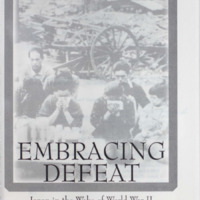-
Title
-
Embracing defeat : Japan in the wake of World War II
-
Description
-
Discusses how the defeat and American military occupation of Japan after World War II affected each level of Japanese society.
-
Identifier
-
782817
-
393046869
-
Creator
-
Dower, John W
-
Format
-
1st ed.
-
Source
-
Brian Lamb Booknotes Collection
-
Gift of Brian Lamb, 2011.
-
Catalog record
-
Language
-
eng
-
Date
-
1999
-
Program air date: March 26, 2000
-
Publisher
-
W.W. Norton & Co.
-
George Mason University. Libraries. Special Collections & Archives
-
Text
-
Transcription of Annotations
Front endpapers provide statistical information on the number of soldiers and civilians killed and wounded, the number of homeless, the number of troops in China, Formosa and Korea, the number of Japanese POWs missing in the USSR, the number of Japanese who returned home between Oct. 1945 and Dec. 1946, and the number of Koreans living in Japan in 1945. Other notes refer to the duration of the American occupation of Japan, the changing of the Meiji Constitution to the version approved by U.S. General Headquarters, which lifted the restrictions on free speech and committed Japan to pacifism, and to the conditions in the country after the war which were characterized by inflation, food shortages, the rise of the Black Market, alcoholism, an outbreak of TB, a shortage of men, and the obligation to pay for the American occupation forces. Back fly sheets and endpapers include notes on the actions of the victors who promoted political freedom and social reform, but initially played no role in the economy, released political prisoners, introduced strong pro-labor legislation, legalized the Communist Party, but wouldn't permit a general strike. Also included are notes on the Recreation and Amusement Association (RAA) which asked young women to work as prostitutes for the 'comfort' of the occupation forces, on the new constitution with its provision for the remuneration of the war, on the fate of several Japanese military war criminals - of 5700 Japanese indicted for war crimes nearly a thousand were condemned to death -, on the Tokyo tribunal which convened for 31 months and which resulted in the execution of seven former Japanese leaders, on CCD (the Civil Censorship Detachment) which was kept secret from the Japanese people, on the question of whether Emperor Hirohito wanted the war or not, and the role of General MacArthur in manipulating history in order to retain the throne and to credit the Emperor with ensuring a smooth transition by showing that he had been opposed to the war. Other notes highlight the U.S. role in developing the Japanese economy by providing 2 billion dollars in aid and using the Japanese industry to produce ammunitions for the Korean War, and include a characterization of General MacArthur as authoritarian, arrogant and ignorant of Japan and its culture, and refer to the remilitarization of Japan after the Korean War, MacArthur's departure from Japan, and the restoration of Japanese sovereignty in 1952. It is noted that the American legacy consists of the creation of a "concentration of bureaucratic authority", and that on the 50th anniversary of the "new charter" not a single word was changed. -- Annotations by Brian Lamb in the margins and underlining of pertinent phrases throughout the book.
-
Relation
-
Original Booknotes interview
-
Rights
-
This work may be protected by copyright laws and is provided for educational and research purposes only. Any infringing use may be subject to disciplinary action and/or civil or criminal liability as provided by law. If you believe that you are the rights-holder and object to Mason’s use of this image, please contact speccoll@gmu.edu.
 782817.pdf
782817.pdf